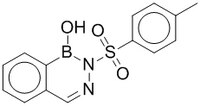530729 Sigma-AldrichAAA-ATPase Drg1 Inhibitor, Diazaborine - CAS 22959-81-5 - Calbiochem
An anti-bacterial compound that targets NAD(P)H-dependent enoyl acyl carrier protein reductase (ENR) resulting in the inhibition of bacterial fatty acid synthase.
More>> An anti-bacterial compound that targets NAD(P)H-dependent enoyl acyl carrier protein reductase (ENR) resulting in the inhibition of bacterial fatty acid synthase. Less<<Synonyms: 2-tosylbenzo[d][1,2,3]diazaborinin-1(2H)-ol, Ribosome Biogenesis Inhibitor, Diazaborine, Drg1 inhibitor
Recommended Products
Overview
| Replacement Information |
|---|
Key Spec Table
| CAS # | Empirical Formula |
|---|---|
| 22959-81-5 | C₁₄H₁₃BN₂O₃S |
Products
| Catalogue Number | Packaging | Qty/Pack | |
|---|---|---|---|
| 5.30729.0001 | Glass bottle | 10 mg |
| Product Information | |
|---|---|
| CAS number | 22959-81-5 |
| Form | White powder |
| Hill Formula | C₁₄H₁₃BN₂O₃S |
| Chemical formula | C₁₄H₁₃BN₂O₃S |
| Reversible | Y |
| Quality Level | MQ100 |
| Applications |
|---|
| Biological Information | |
|---|---|
| Primary Target | Drg1 AAA-ATPase |
| Primary Target K<sub>i</sub> | 26 µ |
| Purity | ≥98% by HPLC |
| Physicochemical Information | |
|---|---|
| Cell permeable | Y |
| Dimensions |
|---|
| Materials Information |
|---|
| Toxicological Information |
|---|
| Safety Information according to GHS |
|---|
| Safety Information |
|---|
| Product Usage Statements |
|---|
| Packaging Information | |
|---|---|
| Packaged under inert gas | Packaged under inert gas |
| Transport Information |
|---|
| Supplemental Information |
|---|
| Specifications |
|---|
| Global Trade Item Number | |
|---|---|
| Catalogue Number | GTIN |
| 5.30729.0001 | 04055977260458 |
Documentation
AAA-ATPase Drg1 Inhibitor, Diazaborine - CAS 22959-81-5 - Calbiochem SDS
| Title |
|---|
References
| Reference overview |
|---|
| Loibl, M., et al. 2014. J. Biol. Chem. 289, 3913. Pertschy B., et al. 2004. Mol. Cell. Biol. 24, 6476. Baldock, C. et al. 1998. Biochem. Pharmacol. 55, 1541. Grassberger M., et al. 1984. J Med Chem. 27, 947. |
















